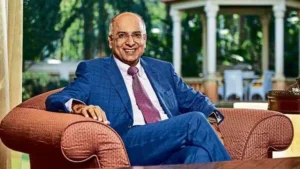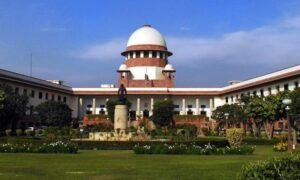Deepak Chhabria, the Chairman of Finolex Cables, has tendered his resignation in response to a scathing rebuke from the Supreme Court, which took umbrage with the National Company Law Appellate Tribunal (NCLAT) in a captivating and intricate legal clash that has ensnared the corporate realm. This historic development marks a watershed moment in the annals of the company, portending far-reaching ramifications for corporate governance and legal proceedings within India.
Background
The genesis of Deepak Chhabria’s resignation can be traced back to a protracted feud between him and his cousin, Prakash Chhabria. Both scions held substantial interests in Finolex Cables, a distinguished name in the realms of cable and electrical equipment industries. The domestic schism between the kin metamorphosed into a legal maelstrom, with each combatant coveting dominion over the influential seat of the organization’s Chairmanship.
Amidst this internecine strife, the National Company Law Appellate Tribunal (NCLAT) issued a ruling that granted Deepak Chhabria the authority to retain his role as Chairman of Finolex Cables. However, this edict was met with skepticism and controversy, casting aspersions on the objectivity and transparency of NCLAT’s adjudicative process. Owing to the pivotal implications for the company, stakeholders and industry savants commenced an extensive inquiry into the matter.
The Intervention of the Supreme Court
The Supreme Court of India interceded at a critical juncture in this high-stakes drama. On the 16th of October, the Supreme Court promulgated a contemptuous censure against the NCLAT members who were responsible for upholding Deepak Chhabria’s chairmanship. This unprecedented action sent reverberations throughout the corporate cosmos and the legal fraternity, underscoring the imperative tenets of transparency, accountability, and rectitude within the domains of corporate governance and legal processes.
The Abdication of Deepak Chhabria

The ultimate determinant in this legal saga were the shareholders. A proposition to reinstall Deepak Chhabria as Executive Chairman was proffered but was met with a resolute dissent. An astounding 72.34% of the electorate cast their ballots against his reinstatement, epitomizing the unequivocal resistance of shareholders to his continuing stewardship. Deepak Chhabria found himself in an intractable predicament, compelled by the Supreme Court’s reprimand, the contentious verdict of NCLAT, and the overwhelming repudiation of his reinstatement. The amalgamation of these events, coupled with the protracted legal wrangling, forced him to take the arduous step of resigning as Chairman of Finolex Cables.
Legal Dramatics and Corporate Subterfuge
The saga of Deepak Chhabria and Finolex Cables stands as an extraordinary exemplar of legal theatrics and corporate machination. It underscores the labyrinthine dynamics that can materialize within family-held enterprises when the struggle for authority reaches its zenith. In this instance, the quest for power became so intense that it garnered the attention of the apex judiciary.
The Controversial Determination of NCLAT Under Intense Scrutiny
The verdict of the NCLAT, sanctioning Deepak Chhabria’s continued Chairmanship, elicited ire in both legal and corporate precincts. Detractors posited that it exhibited bias, opaqueness, and a dearth of transparency. The decision underwent rigorous scrutiny, with many raising inquiries regarding the rationale behind it. Thus, the case transitioned from a family feud to a national conundrum, underscoring the weightiness of upholding the acme of ethical and legal standards in corporate governance.
The Sanctity of Justice Upheld by the Supreme Court

The decision of the Supreme Court to initiate contempt proceedings against the NCLAT members marked a seminal juncture. It enunciated unequivocally that the integrity of the legal process and the edifice of corporate governance should never be jeopardized. This intervention underscored the court’s role as the sentinel of justice and impartiality, inculcating the principle that decisions in such instances must be untainted by bias.
Shareholder Disapproval and Its Implications
The resounding repudiation of Deepak Chhabria’s reinstatement served as one of the most profound barometers of public sentiment in this narrative. Shareholders, who are invested in the company’s prosperity, voiced their dissatisfaction with unwavering clarity. This mandate delineated an appetite for a transformation in leadership and, in myriad ways, validated the concerns articulated by those who had questioned the antecedent ruling of NCLAT.
A Decisive Epoch for Finolex Cables
Deepak Chhabria’s abdication from the Chairmanship constitutes a transformative moment in the history of Finolex Cables. The company’s blueprint for navigating these turbulent waters, along with the forthcoming changes in its leadership and governance framework, remains enshrouded in uncertainty. The case has cast a glaring spotlight on the imperative nature of ensuring that determinations made at the zenith of an organization are evenhanded, just, and in the superlative interests of all stakeholders.
Lessons for Corporate India
The saga of Deepak Chhabria carries profound implications for the landscape of Indian corporate governance. It accentuates the necessity for transparency, equity, and accountability in corporate decision-making. The intervention of the Supreme Court in this instance serves as an indelible reminder that neither individuals nor institutions are beyond the purview of the law and that all decisions should be executed with unimpeachable integrity. The case manifestly establishes that even within closely held enterprises, the aegis of fairness and justice must invariably prevail.
Conclusion
The chronicle of Deepak Chhabria and his relinquishment as Chairman of Finolex Cables is a riveting narrative of legal conflicts, corporate governance, and the pursuit of justice. It underscores the gravity of forthright, accountable, and ethical corporate practices. The intervention by the Supreme Court serves as a vivid affirmation that the principles of justice and integrity must reign supreme at all echelons of corporate decision-making, irrespective of the magnitude of the organization. As the legal skirmish continues and Finolex Cables forges ahead under new leadership, this case shall indelibly stand as a watershed moment in the annals of India’s corporate history.










